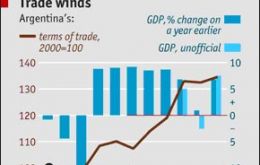MercoPress. South Atlantic News Agency
Stories for August 22nd 2010
-
Sunday, August 22nd 2010 - 04:28 UTC
Shell defies in court Argentine government ban on fuel increases

Royal Dutch Shell which refines about 15% of Argentina’s fuel is waging a court battle against a government ban that prevents fuel producers from increasing prices. Shell’s federal court complaint was filed last week following a government order on August 18 mandating oil companies to lower fuel prices to a pre-August 1 level.
-
Sunday, August 22nd 2010 - 04:24 UTC
Plastic debris in the Atlantic Ocean seems to have peaked, say US scientists

A study has measured the amount of plastic debris found in a region of the Atlantic Ocean over a 22-year period. US researchers, writing in Science, suggest the volume of plastic appeared to have peaked in recent years.
-
Sunday, August 22nd 2010 - 04:23 UTC
Massive loss of pilot whales stranded on New Zealand beach

Only nine of the 63 pilot whales which were found stranded on a beach of New Zealand’s northern island on Friday are believed to have survived. Thirteen whales were re-floated Saturday but four of them got back into difficulty and NZ Department of Conservation staff made the tough decision to euthanize them.
-
Sunday, August 22nd 2010 - 03:05 UTC
The Economist on Argentina's economy: happy-go-lucky Cristina

Earlier this year, Cristina Fernández de Kirchner, Argentina’s president, proffered some advice to European governments facing recession and market panic. Its essence was “stuff the IMF and carry on spending.” It is what she and her predecessor and husband, Néstor Kirchner, have practiced since 2003. Argentina is one of only a handful of countries that refuse all dealings with the IMF. Almost a decade after it defaulted on $90 billion of debt when its economy collapsed, it still has few financial ties with the world and very little bank credit. Yet contrary to repeated forecasts of doom from orthodox economists, the economy is roaring.
-
Sunday, August 22nd 2010 - 02:58 UTC
Expanding Alliances in the 21st Century: The U.S. and Brazil Unite to Address Matters of National Security
The recent signing of a new defense agreement between the Western hemisphere’s two dominant powers, Brazil and the United States, has brought about an important change to Latin America’s relations with the U.S. On April 12, 2010, Brazil took another step to enhance its geopolitical influence by signing the U.S.-Brazil Defense Cooperation Agreement (DCA).
